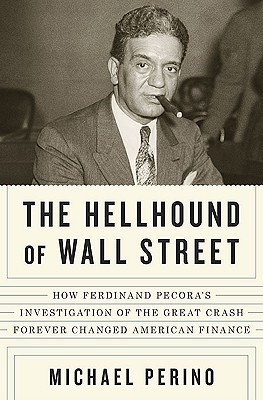I am just finishing Micheal Perino’s riveting biography, The Hellhound of Wall Street: How Ferdinand Pecora’s Investigation of the Great Crash Forever Changed American Finance. The book is extraordinary for its historical detail, perspective and human drama that reads more like a gripping crime novel than a biography. One can barely put it down; thoroughly entertaining and educational.
In our time of few worthy leaders, Pecora is a character to admire. The title does over-reach a little in its claim that Pecora’s work helped change American finance forever. Our current ongoing financial crisis proves that it did not. The behaviors and actors–many of the exact same abusive tricks and institutions (JP Morgan and Citibank-then “City Bank”) and a captured Congress–have all been up to the same antics today as they were in the 20’s and 30’s. Remarkable deja vu. But the story of Pecora proves that the extractive forces of financial fraud and oppression can indeed be overcome when good people are prepared to take a stand and insist on restoring the rule of law on bankers.
In The Hellhound of Wall Street, Michael Perino recounts in riveting detail the 1933 hearings that put Wall Street on trial for the Great Crash. Never before in American history had so many financial titans been called to account before the public, and they had come within a few weeks of emerging unscathed. By the time Ferdinand Pecora, a Sicilian immigrant and former New York prosecutor, took over as chief counsel, the investigation had dragged on ineffectively for nearly a year and was universally written off as dead.
The Hellhound of Wall Street provides a minute-by-minute account of the ten dramatic days when Pecora turned the hearings around, cross- examining the officers of National City Bank (today’s Citigroup), particularly its chairman, Charles Mitchell, one of the best known bankers of his day. Mitchell strode into the hearing room in obvious disdain for the proceedings, but he left utterly disgraced. Pecora’s rigorous questioning revealed that City Bank was guilty of shocking financial abuses, from selling worthless bonds to manipulating its stock price. Most offensive of all was the excessive compensation and bonuses awarded to its executives for peddling shoddy securities to the American public.
Pecora became an unlikely hero to a beleaguered nation. The man whom the press called “the hellhound of Wall Street” was the son of a struggling factory worker. Precocious and determined, he became one of New York’s few Italian American lawyers at a time when Italians were frequently stereotyped as anarchic criminals. The image of an immigrant lawyer challenging a blue-blooded Wall Street tycoon was just one more sign that a fundamental shift was taking place in America.



